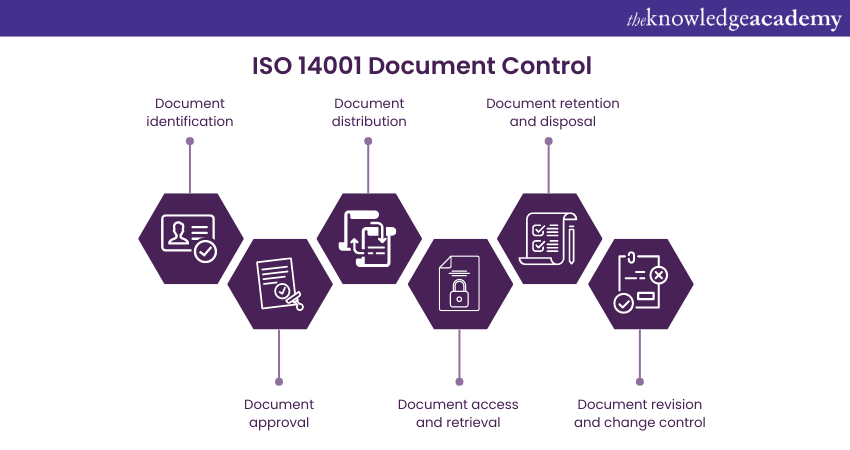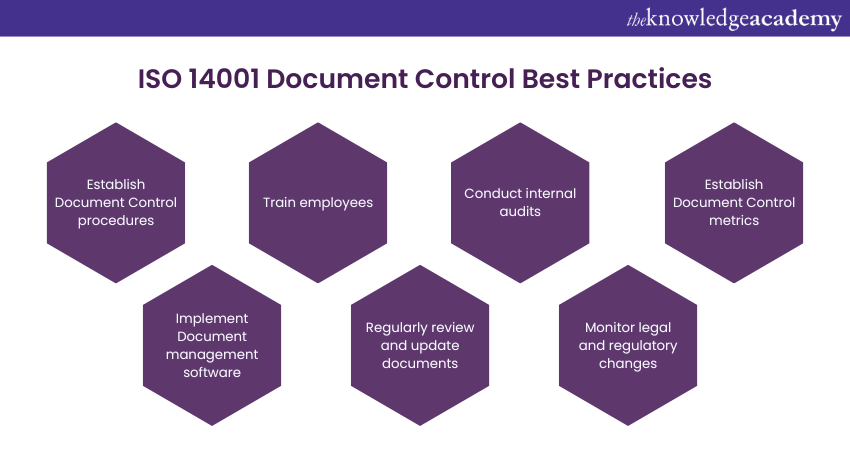We may not have the course you’re looking for. If you enquire or give us a call on + 1-866 272 8822 and speak to our training experts, we may still be able to help with your training requirements.
We ensure quality, budget-alignment, and timely delivery by our expert instructors.

Feeling overwhelmed by environmental regulations and managing a mountain of paperwork? An effective ISO 14001 Document Control system can be your saving grace! Ensuring Compliance with ISO 14001, the International Standard for Environmental Management Systems (EMS), requires meticulous document management. But where do you begin?
This comprehensive blog delves into the world of ISO 14001 Document Control. We'll unveil best practices for creating, controlling, and maintaining your environmental documentation. Discover how to streamline processes, ensure accuracy, and guarantee easy access to critical information. So, ditch the document chaos and embrace a greener future with a well-organised EMS!
Table of Contents
1) Understanding Document Control ISO 14001
a) Legal compliance
b) Consistency and standardisation
c) Version control
d) Continual improvement
2) Key elements of ISO 14001 Document Control
a) Document identification
b) Document approval
c) Document distribution
d) Document access and retrieval
e) Document retention and disposal
f) Document revision and change control
3) Best practices for ISO 14001 Document Control
a) Establish Document Control procedures
b) Implement Document management software
c) Train employees
d) Regularly review and update documents
e) Conduct internal audits
f) Monitor legal and regulatory changes
g) Establish Document Control metrics
4) Conclusion
Understanding Document Control ISO 14001
Document control within the framework of ISO 14001, which pertains to Environmental Management Systems, involves a systematic approach to managing and protecting important records. A robust Record Management system ensures:
a) Electronic documents critical for environmental assessment are properly recorded and replicated.
b) Physical records are protected from damage through adequate storage in designated areas.
c) A pre-established quality control documentation system is in place.
d) Records subject to specific time constraints are retained for a minimum duration necessary for audit trials.
e) Archived records held off-site by the department are stored in a safe and suitable location.
f) Obsolete records are securely disposed of once their retention period expires
The following points highlight the importance of document control in ISO 14001:
a) Legal Compliance: Document control ensures that organisations operating within the ISO 14001 framework remain informed and compliant with pertinent environmental laws and regulations. This aspect of document control is crucial, as it rewards organisations for their commitment to environmental legal standards through recognition and potential incentives.
b) Consistency and Standardisation: Implementing uniform document formats, naming conventions, and control procedures standardises organisational documentation. This standardisation fosters clarity and ease of understanding, enhancing communication effectiveness among employees and What is a Stakeholder.
c) Version Control: Document control safeguards access to the most current documents, significantly reducing the risk of utilising outdated information. By maintaining version control, organisations minimise the use of obsolete documents, which could negatively affect operations.
d) Continual Improvement: Effective document control enables organisations to gather insights, anticipate changes, and foster enhancements in Environmental Management processes. This ongoing refinement of practices offers organisations opportunities for steady improvement and optimisation.

Key elements of ISO 14001 Document Control
ISO 14001 document control encompasses several key elements that organisations need to consider when managing their EMS documentation. These elements include:

a) Document identification: Each Environmental Management System (EMS) document is assigned a unique identifier, facilitating swift location and retrieval. This identification process is crucial for efficient document tracking and management.
b) Document approval: Establishing a rigorous validation process for document use is essential, which includes endorsement by competent authorities. This ensures that all documents are thoroughly reviewed, officially sanctioned prior to deployment, and aligned with the requirements of the Difference Between ISO 9001 and ISO 14001 standards.
c) Document distribution: It is imperative for organisations to devise strategies to control the dissemination of documents, guaranteeing that only pertinent documents are distributed to designated recipients. This process is key to managing the flow of documentation effectively.
d) Document access and retrieval: Access to secure document control must be restricted to authorised personnel, while also ensuring that necessary documents are readily available when required. This involves setting appropriate security clearances and safeguarding document confidentiality and integrity.
e) Document retention and disposal: Organisations must define standard protocols for the duration of document retention, including procedures for the prompt disposal or archiving of outdated or superfluous documents. This policy outlines the lifespan of records and the secure elimination of non-essential or obsolete documents.
f) Document Revision and Change Control: Maintaining a robust change control process is vital for overseeing document revisions, documenting the rationale behind changes, monitoring alterations, and informing all relevant stakeholders. An effective document revision strategy encompasses mechanisms for managing updates, recording change justifications, and communicating with all involved parties.
Conduct internal and external audits, by signing up for the ISO 14001 Course now!
Best practices for ISO 14001 Document Control
Implementing effective document control practices can enhance an organisation's ability to meet ISO 14001 requirements. Here are some best practices to consider:

a) Document control procedures: Formulate clear and concise protocols that delineate the creation, approval, dissemination, access, and modification of documents within an EMS. These procedures should provide explicit guidance on document 14001 Lifecycle management within the system.
b) Document management software: Deploy document management software to streamline the document control process. This technology ensures robust version control, restricted access, and comprehensive audit trails, thereby enhancing the workflow within the ISO 14001 framework.
c) Employee training: Conduct thorough training for employees on document control practices, emphasising adherence to processes and clarifying individual responsibilities. This training is essential to ensure that document handlers are fully aware of their roles in managing and accessing documents.
d) Document review and update: Perform consistent audits on EMS documentation to identify and correct any errors, inconsistencies, or outdated information. This practice ensures ongoing adherence to the EMS’s accuracy standards and promotes continuous improvement.
e) Internal Audits: Execute regular ISO 14001 self-audits to evaluate the effectiveness of the document control system and identify areas for enhancement. Internal ISO 14001 Audits are instrumental in assessing the robustness of document control practices and informing organisational decision-making.
f) Monitoring legal and regulatory changes: Vigilantly track environmental regulations to ensure that documents remain aligned with current legal requirements. This ongoing surveillance ensures that documentation reflects the latest environmental laws and regulations.
g) Document control metrics: Establish metrics to measure the efficacy of document control activities, such as retrieval times, accuracy of records, and adherence to retention schedules. These metrics allow organisations to gauge the precision and efficiency of their document control processes, paving the way for proactive improvements.
Conduct successful internal audits by signing up for the ISO 14001 Internal Auditor Course now!
Conclusion
With the ISO 14001 Document Control best practices in your toolkit, along with an understanding of the Difference Between ISO 14001 and ISO 45001, you’re all set to enhance your Environmental Management System (EMS). This is your chance to make compliance a breeze and take confident strides towards environmental sustainability. It’s time to take charge of your documents and ensure they serve your purpose, rather than being bogged down by them. Let’s transform your document management from a task into a triumph. Together, we’ll pave the way for a greener, more efficient future.
Implement ISO principles to acquire environmentally friendly organisational standards, by signing up for ISO 14001 Training.
Frequently Asked Questions
What is the purpose of document control in ISO 14001?

Document control ensures the precision and accessibility of documents within an EMS, facilitating compliance, minimising errors, and supporting continuous improvement.
How does ISO 14001 Document Control benefit an organisation?

It streamlines operations, enhances decision-making, and aids in achieving environmental goals by maintaining document integrity and compliance
What are the other resources and offers provided by The Knowledge Academy?

The Knowledge Academy takes global learning to new heights, offering over 3,000 online courses across 490+ locations in 190+ countries. This expansive reach ensures accessibility and convenience for learners worldwide.
Alongside our diverse Online Course Catalogue, encompassing 19 major categories, we go the extra mile by providing a plethora of free educational Online Resources like News updates, Blogs, videos, webinars, and interview questions. Tailoring learning experiences further, professionals can maximise value with customisable Course Bundles of TKA.
What is the Knowledge Pass, and how does it work?

The Knowledge Academy’s Knowledge Pass, a prepaid voucher, adds another layer of flexibility, allowing course bookings over a 12-month period. Join us on a journey where education knows no bounds.
What are related Courses and blogs provided by The Knowledge Academy?

The Knowledge Academy offers various ISO 14001 Certifications, including ISO 14001 Foundation Course, ISO 14001 Lead Auditor Course and ISO 14001 Internal Auditor Course. These courses cater to different skill levels, providing comprehensive insights into ISO 14001 Risks and Opportunities.
Our Health & Safety Blogs covers a range of topics offering valuable resources, best practices, and industry insights. Whether you are a beginner or looking to advance your skills, The Knowledge Academy's diverse courses and informative blogs have you covered.
Upcoming Health & Safety Resources Batches & Dates
Date
 ISO 14001 Foundation Certification
ISO 14001 Foundation Certification
Mon 7th Apr 2025
Mon 2nd Jun 2025
Mon 11th Aug 2025
Mon 13th Oct 2025
Mon 8th Dec 2025






 Top Rated Course
Top Rated Course


 If you wish to make any changes to your course, please
If you wish to make any changes to your course, please


